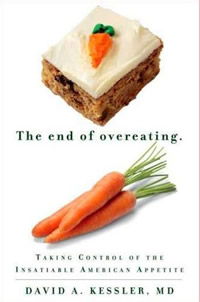Book Notes
 David A. Kessler, The End of Overeating; Taking Control of the Insatiable American Appetite (New York: Rodale, 2009), 320pp.
David A. Kessler, The End of Overeating; Taking Control of the Insatiable American Appetite (New York: Rodale, 2009), 320pp.
David Kessler has been head of the FDA from 1990–1997, dean of the medical schools at Yale and UCSF, and professor at Columbia Law School, but since food is no respecter of age, class, gender, or socio-economic class, he admits that, like millions of people, he's "firmly in the camp of the overeaters. For much of my life, sugar, fat, and salt held remarkable sway over my behavior. I have lost weight, gained it back, and lost it again — over and over and over. I have owned suits in every size." Why does Kessler speak for so many of us? Why does food hold such power over him when he does almost nothing else in his life on impulse?
Across 48 short chapters, Kessler describes dozens of scientific studies from the government, science, and medicine, interviews with experts of all sorts, anecdotes from popular chain restaurants, and experiences from industry conventions. People overeat and struggle with their weight not primarily because of a lack of will power, genetics, metabolism, or even lack of exercise, even though these are important factors. Rather, our neurobiology has been effectively rewired by an avalanche of what one food industry executive calls their "three points of the compass" — sugar, fat, and salt. The food industry aggressively manipulates our minds and desires to exploit the biology of our brains. Artificial chemicals and relentless marketing lead to psychological and physiological conditioning, making "conditioned hypereating" nearly irresistible. "Everything that has made us successful," admits one food executive, "is the problem."
But we have a choice. In the last part of his book Kessler recommends a sort of behavior modification. Knowing what's going on in our brains and bodies is the first step, and Kessler's book is a huge help. We must recognize our vulnerability to human biology and food industry manipulation. Our susceptibility to biological reconditioning is not a character flaw, but in combination with the food industry it is a powerful force. Kessler describes how he's learned to say "no" early and often, replace old habits with new ones, and summon alternate responses to all the cues, rewards, and feedback to which we've become accustomed. "Food rehab" can conquer the "superstimulating nature of food," although it won't be easy — the best analogies might be comparisons with the effort needed to conquer addictions of nicotine, alcohol, or even cocaine. This is an important book, practically written for a general audience, and deserving of a wide readership.


